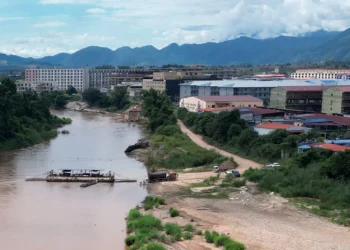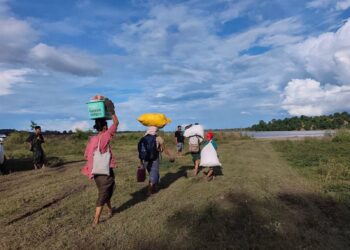In early September, thousands of people from across Myanmar formed massive queues at the border between China and northern Shan State. People had to queue for days, even sleeping in place to hold their spots. Before long, a black market emerged, with queue positions being bought and sold for up to K200,000 – nearly US$100.
“The number of people queuing here is massive, and some have even fainted. Non-profit groups are on standby to assist and take care of them,” said one woman in September as she waited in line in Muse, the biggest border town in Shan.
The queues were the result of the re-introduction on September 4 of a Temporary Border Pass scheme that allows Myanmar nationals to visit China for a limited period of time. Since March 2020, border crossings with China have been severely restricted due to the outbreak of COVID-19. For this and other reasons, the pandemic dealt a serious blow to Myanmar’s economy, which was exacerbated by the 2021 military coup and subsequent civil war.
Desperate for work amid this economic downturn, thousands of people have been hoping to use the TBP scheme to find long-term employment in China, even though it’s only meant to be used for short-term visits.
“I’ve heard that China offers more job opportunities than here, and the salaries are also attractive,” said Ma Mya Lay, a daily wage farmer from Mandalay who came to Muse in hope of securing a TBP card and finding a job in China.
“My income is unstable because I can only work when someone hires me, and getting by has become harder and harder due to increasing commodity prices,” she explained.
Scrambling to corral the queues, local authorities introduced a two-step token system for TBP applications on September 13. People now have to start by queuing at an office in Muse to get a token, which states the future date on which they’re allowed to queue for their TBP card at the border.
U Maung Myint*, an official from the Muse Humanitarian Aid Network, a charity group, said that due to the token system, “there are no longer problems such as crowding, traffic or the sale of queue spots”.
But because China only allows a few hundred people to cross the border per day, the tokens often come with appointment dates that are more than a week in the future, entailing long and expensive stays in Muse.
According to the lists published by the junta and the Muse Humanitarian Aid Network, some 8,000 people had received such tokens by the end of September.
A ‘tough’ search for work
Once a TBP card is secured and a prospective worker crosses the border, many obstacles remain.
The TBP allows Myanmar nationals to enter China for periods ranging between three to 13 days, according to Myanmar state media. It can be obtained by any citizen with a national ID, for a fee of K1,000.
Many of those seeking to enter China on a TBP worked there before the pandemic and have been languishing in unemployment or severely underpaid work in Myanmar in the years since.
“I previously worked at a garment factory in Ruili, China in 2019, but my parents wanted me to return during COVID-19,” said Ma Aye, a 20-year-old woman from Monywa Township in Sagaing Region. “I’m going back to the same factory and have already been in contact with the factory owner.”
Ruili, known as Shweli in Burmese, is the Chinese border town across from Muse.
Ma Aye arrived in Muse on September 11 and received her TBP card on September 20. During that time, the guesthouses near the border were fully booked, so she had to camp out at a religious building.
“Previously, I entered with a Border Pass arranged by the factory owner in China. It wasn’t as difficult then, and not as crowded. I was told that BP is only for locals, but I don’t know how the owner managed it. I had to pay a K30,000 fee,” Ma Aye said.
The Border Pass, known colloquially as the red book, is valid for one year but by law can only be obtained by people whose national IDs say they live in Muse District, although this apparently wasn’t a problem for Ma Aye before the pandemic. While the official fee for a BP is K3,000, Maung Myint said individuals from outside the district can pay brokers to illegally obtain one, with some people paying as much as K5 million.
While TBP holders are meant to return to Myanmar after their pass expires, Chinese employers have promised some workers they can get them residency cards and work permits.
“This time, the owner told me to just come with a TBP and assured me that they would provide valid documents for me to stay there once I entered China,” said Ma Aye. “I feel confident about going there because of this guarantee. Otherwise, it wouldn’t be okay because my TBP only allows for a one-week stay.”
Ma Aye said she has also organised a group of nearly 50 people from her region, most of whom have never been to China, to accompany her to Ruili with TBP cards.
“The factory owner has also allowed them to come, and they will work at the same factory as me. There is a huge number of people who want to work in China now,” she said.
Others come with hopes of employment, but no contacts and no plan, making it much harder to skirt the rules of the TBP card.
A 20-year-old woman from Yangon arrived in Ruili, where her sister lives, hoping to find a job, but to no avail.
“I’m staying at my sister’s place in Ruili and trying to find a job. It’s really tough because I only have a TBP card. They’re not willing to hire people with this card, and there are also many other Myanmar citizens looking for jobs.”
She said she will return to Muse when her card expires, rather than risk illegally overstaying with no job offer. There, she will begin the process anew, despite the costs in time and money.
“It’s quite expensive to go back to Muse and wait for another TBP card. I had to rent a guesthouse in Muse for K8,000 per night for more than a week to get my current TBP card. But I’m really determined to find a job since my sister is already here.”
Others have given up for now.
Ko Soe Thu went to China with a TBP card on September 20 to find a job, but he returned empty-handed.
“It’s really hard to find a job in China with a TBP card. Some people manage to get one, but it doesn’t work out for everyone,” said Ko Soe Thu, who went back to his hometown of Meiktila in Mandalay Region discouraged.
“I’m only planning to go back if they start issuing the red book,” he added. “I’m a farmer, so I wanted to go to China for some extra income. As you probably know, most of the jobs here don’t pay very well.”
A Myanmar trader living in Ruili said many migrants have run into the same problem. “The Chinese government does not issue a permit to stay if they come with a TBP card. That’s why some people enter with a TBP card and only stay for the permitted time, taking on daily wage jobs. Most struggle to find permanent employment,” he said.
But it’s unlikely that people will stop coming to try their luck. According to a report last year by the International Organization for Migration, approximately 40,000 Myanmar citizens are leaving the country each month due to economic hardship and armed conflict.
Maung Myint acknowledged these factors, and said adding to the numbers are many workers “who left China during COVID-19 now returning”.
Scams and wage cuts
Those who secure a BP, or red book, must on arrival in China apply for a labour permit, social security and healthcare from the Chinese government, said residents of Muse and neighbouring Namkham Township.
They require a recommendation from their Chinese employer for these documents, which poses a challenge for workers without stable employment. Those without valid documents are vulnerable to exploitation or arrest.
The black market for red books has also given rise to scams.
Ko Aung Kyaw Moe, a mason from Magway Region’s Kamma Township, said he contacted a broker who told him he could buy a BP for K800,000, but the relatively low fee made him suspicious.
“I didn’t trust the broker and was afraid of being cheated. I heard most people have to pay K3-4 million to get a red book,” he said.
The sudden influx of new job seekers has also enabled Chinese employers to cut salaries, exploiting their workers. The trader in Ruili said Myanmar workers with full-time jobs in shops and restaurants were earning 3,000-3,500 yuan ($410-480) per month, with free room and board, but that was reduced to CNY2,500 after the TBP cards were introduced in September.
Ko Kyaw Myo moved from Meiktila to China to work in a factory in 2018, and is among those who never left during the pandemic. He said earlier this year he was making about CNY2,300 per month, but as more people entered with TBP cards, it was cut to CNY1,800. And those on the precarious TBP card earn even less.
“I’ve seen that the factory now accepts some Myanmar workers who enter with TBP cards. I’m not sure about what guarantees they receive. I’ve heard they earn around CNY1,300 per month,” he said. “Even though they reduced my pay, it’s still better than what I could get back home. So, I don’t really have any choice but to stay here.”
A representative of the Shwe Myanmar Online Emergency Healthcare Association in Ruili said most people entering China with TBP cards are from Sagaing and Magway regions – two of the regions most affected by the post-coup conflict – or Rakhine State, which was battered by its own conflict in 2018-2020 and is one of the poorest parts of the country.
He said he hasn’t heard about the Chinese government taking action against undocumented workers yet, but many business owners are afraid to offer TBP-holders jobs. He described an atmosphere of uncertainty, where local authorities seem content to turn a blind eye for now but the threat of a crackdown is always looming.
“Owners worry about potential punishment or fines from their government,” he said. “Only those who abide by the law can conduct business in peace. Nothing will happen if the authorities don’t conduct investigations or make arrests, but if they do, there’s little anyone can do.”
He added that the current restrictions already incentivise people smuggling, which could increase if they are more rigorously enforced.
Frontier reached out to U Nyunt Win, permanent secretary at the junta’s labour ministry, but he declined to comment.
Starting in October, the two countries agreed to allow Myanmar nationals to cross the border at the Nan Daw gate in Muse with passports, but they must obtain a business visa beforehand. Jobseekers and residents of Muse said these visas are intended for the owners and representatives of Myanmar companies who want to do business in China, and are largely inaccessible to ordinary migrant workers.
“At first I was happy when I heard we can go to China with a passport, but they’re only allowing business visas, which aren’t available for people like me who want to go work,” said Aung Kyaw Moe, the mason from Magway.
While many are envious of people like Ma Aye who have secured a job, for her, it’s bittersweet.
“I would prefer to work in my country, if possible, but three or four months’ salary in Myanmar is equal to one month’s salary in China,” she said.
“When I looked at the long queue for the TBP, I wondered if there were any young people left in my county.”
*indicates use of a pseudonym for security reasons
SOURCE – FRONTIER






